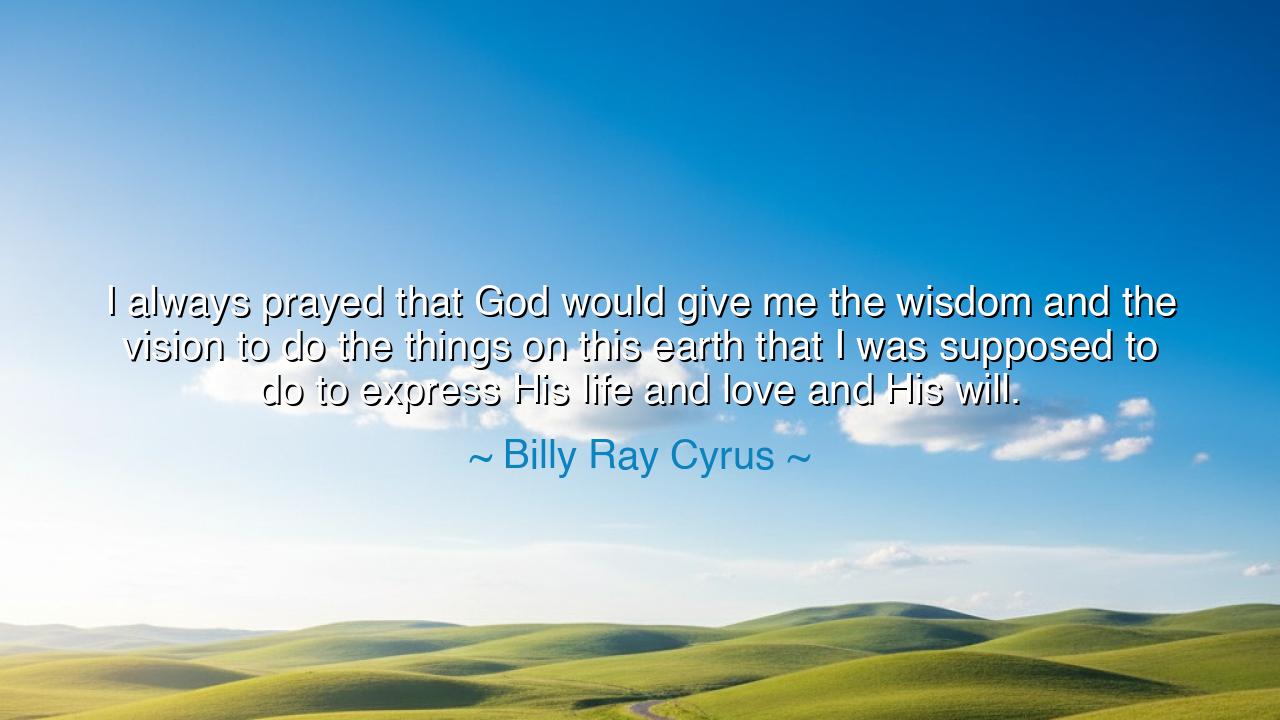
I always prayed that God would give me the wisdom and the vision
I always prayed that God would give me the wisdom and the vision to do the things on this earth that I was supposed to do to express His life and love and His will.






Billy Ray Cyrus, in the simplicity of faith and the yearning of the heart, declares: “I always prayed that God would give me the wisdom and the vision to do the things on this earth that I was supposed to do to express His life and love and His will.” In these words lies the confession of a soul who knows that human strength alone is insufficient. He seeks not fame nor fleeting triumph, but wisdom to discern the right path, and vision to see beyond the fog of daily struggle, that his life might become an instrument of divine purpose.
The ancients themselves lifted up the same prayer. King Solomon, when offered by God anything he desired, asked not for wealth or long life, but for wisdom to govern his people. In response, he was granted a discerning heart, and his name became a beacon of judgment and insight. Cyrus stands in that tradition, praying that his works on earth would not be empty pursuits of vanity, but reflections of God’s will, bringing life and love into the world.
History bears testimony in the life of Florence Nightingale, who, guided by her vision of divine calling, brought healing to soldiers in the Crimean War. She endured hardship and scorn, yet her vision and wisdom reshaped the practice of nursing and saved countless lives. She, like Cyrus, believed her work was not merely her own, but a way to express God’s compassion and will on earth.
Cyrus’s words also remind us that true greatness is not measured by personal ambition but by alignment with something higher. The desire to express His life and love is the mark of humility and purpose, a recognition that human gifts—whether in art, in service, or in leadership—become luminous only when surrendered to the divine. This is not weakness but strength, for it anchors human action in eternal meaning.
Let future generations remember: to pray for wisdom and vision is greater than to pray for success. For success may perish, but wisdom endures; vision shapes lives beyond one’s own. When a man or woman seeks to live as a vessel of God’s love, their deeds ripple outward, touching the unseen corners of the world. And thus their life, however ordinary it may seem, becomes heroic—an offering not of self alone, but of divine purpose made flesh.






HPHa Phuc
I’m intrigued by the combination of prayer, wisdom, and purpose expressed here. Does this suggest that true fulfillment arises from aligning one’s talents with a higher calling rather than personal ambition alone? I also question how one measures whether their actions truly express love, life, or divine will—are there tangible indicators, or is it primarily an internal sense of alignment? This quote invites reflection on how spirituality, intention, and everyday choices intersect in crafting a meaningful life.
HGHuy Gao
This quote highlights a profound sense of responsibility and devotion. I wonder how such a mindset affects resilience and handling setbacks—does framing challenges as part of fulfilling God’s will provide motivation and perspective? It also prompts questions about mentorship and influence: can one’s faith-inspired vision inspire others without imposing beliefs, and how does this shape the legacy one leaves behind? Finally, how does this focus on divine guidance intersect with modern expectations of personal achievement and autonomy?
DTNguyen Dang Thinh
Reading this, I’m curious about the role of vision in aligning life’s work with spiritual beliefs. How does one discern which actions or projects truly reflect divine will versus personal desire? It also makes me think about accountability and reflection: does praying for wisdom involve regularly evaluating choices and their impact? This raises the broader philosophical question of how humans navigate the tension between destiny, intention, and free will while striving to live a meaningful life.
KANguyen Thi Kim Anh
I find this statement deeply introspective and inspiring. It raises questions about the balance between divine guidance and personal effort: to what extent does one rely on prayer versus actively seeking opportunities to fulfill one’s calling? I also wonder how this perspective influences decision-making, career choices, and relationships. Does seeking God’s wisdom and vision encourage humility and ethical consideration in actions, and how does it translate into concrete contributions to society or community?
TLNguyen Thuy Linh
This quote makes me reflect on the intersection of faith and purpose. How do personal beliefs shape the way individuals interpret their talents and responsibilities? I’m curious whether Cyrus sees wisdom and vision as divine gifts or as qualities he actively cultivates through prayer and reflection. It also prompts a broader question: can people who do not share his religious perspective experience a similar sense of purpose and direction through other means, such as philosophy, mentorship, or personal values?